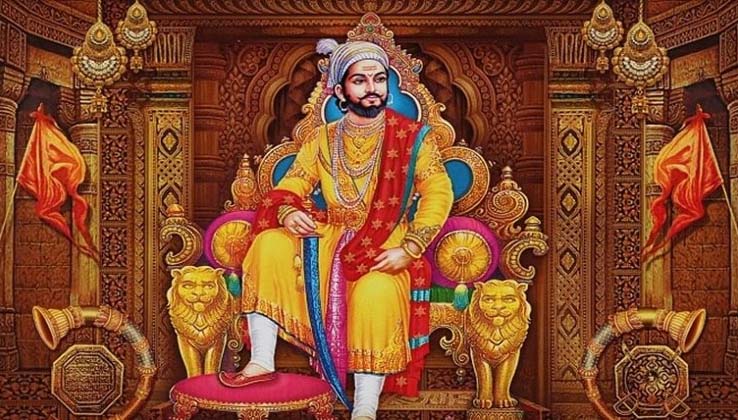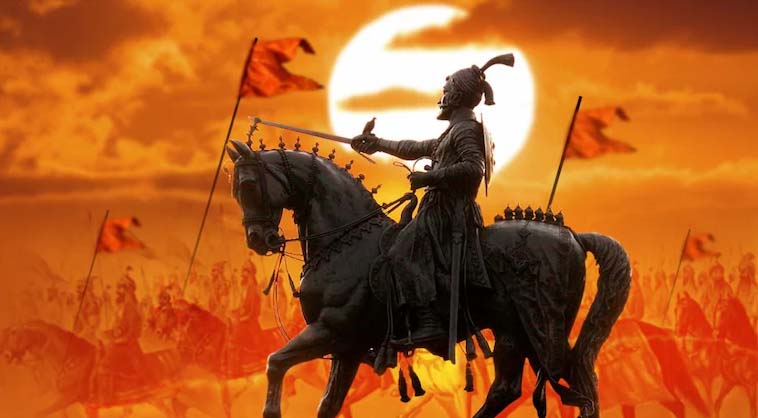“From Kabul to Kandahar my Taimur family created the Mogul Sultanate. Iraq, Iran, Turkistan, and many more countries my army defeated ferocious warriors. But in India Shivaji put brakes on us. I spent my maximum energy on Shivaji but could not bring him to his knees.
Ya Allah, you gave me an enemy, fearless and upright, please keep your doors to heaven open for him because the world’s best and large-hearted warrior is coming to you.”
-Aurangzeb (After Shivaji’s death, while reading Namaz)
The history of India would be an incomplete saga without mentioning the Marathas and the remarkable achievements of Shivaji Maharaj who is a source of inspiration for the future generation and pride of our generations. His birth anniversary is celebrated on February 19 every year as Chhatrapati Shivaji Jayanti. This year we will be celebrating the 393rd birth anniversary of Chhatrapati Shivaji – the great Maratha – who was undoubtedly one of the bravest, most resourceful, and capable monarchs of India.
It is yet another occasion to recount the achievements of the iconic leader with nostalgia and pride as well as his role in nation-building.
Shivaji was a military genius and an able administrator who not only carved an empire from scratch but it also gave the spark for national rejuvenation. “Shivaji, the Management Guru” is a subject taught at Boston University. Shivaji as a nationalist encouraged the use of Marathi and Sanskrit in his administration, instead of Persian which was the norm in those times.
Chhatrapati Maharaj Shivaji epitomized the 5 C’s – Character, Commitment, Competence, Courage, and Compassion. He was a benevolent ruler, as well as a liberal and constructive administrator who carved out an independent kingdom through his single-minded passion, honesty, courage, military acumen, astute diplomacy, and clarity in pursuit of a strategic outcome. To quote
“Shivaji is just not a name, it is an energy source for Indian youth, which can be used to make India free.”
Shivaji established the most powerful Hindu kingdom in southwestern India from 1642-1680. His name is etched in the annals of Indian history for rekindling the spirit of nationhood, and for building his empire against impossible odds. At the age of 16, young Shivaji seized the Torna fort and by the age of 17, he had seized the Raigad and Kondana forts. Shivaji Maharaj as he is popularly known was named Shivaji Bhonsle and was a member of the Bhonsle Maratha clan.
Shivaji’s observed a completely non-feudatory form of administration where his soldiers, commanders, military strategists, Brahmins, and lower castes such as Holkars and Mahars were given an equal opportunity to compete on merit.
For the first time in the modern era, jobs were not necessarily connected to one’s caste. Gender equality and respect for women was his strength. Any digression in this aspect met his wrath. Women, starting with Shivaji’s mother Jijabai, showed interest in administration and were encouraged to participate in state matters. Shivaji represented the notion of secularism. Even Muslims were treated equitably. His own chief secretary was a Muslim. Shivaji was always deeply influenced by the ancient Hindu epics and his quest for establishing an equal-opportunity society. He respected all religions without prejudice.
Shivaji was a devout Hindu but was far from fanaticism. He was socially and tolerant towards other religions giving complete religious freedom to his populace and opposing forced conversions. His several military commanders were Muslims who remained faithful to him till their own death.
As an able administrator, Shivaji Maharaj was well known for his benevolent attitude toward his people and the close bonding between the state and the citizens. He encouraged all socio-economic groups to participate in the ongoing political/military struggle. Shivaji was a leader who led by example with his subjects his greatest strength through his forthrightness and good conduct.

As a strategist, Shivaji Maharaj understood the larger picture with clarity and made plans meticulously to execute with precision and flexibility to adapt to changes. As a military leader, Shivaji developed and devised a technique of defence and offense through hundreds of forts as a necessary adjunct to guerrilla methods adopted by him. There are three lines of distinct forts in Maharashtra that can be recognized even in the present day. The main forts are on the top of the Sahayadri range; then there are two main lines of them, one on the eastern and the other on the western spurs of the mountain ranges. Besides, some sea forts were constructed by Shivaji on inaccessible rocks near the sea coast as a counter to foreign maritime powers.
Sindhudurg, Vijaydurg, Kolaba, and Suvarnadurg are some of his major sea forts. Shivaji was an expert in the conduct of hybrid warfare and it is also noteworthy that the Mughals never used guerrilla warfare against Maratha forces because they knew the Maratha’s exceptional skills in guerrilla warfare. Shivaji was an exponent of manoeuvre warfare with speed, surprise, agility, and attacking the enemy’s weakness its principal tools. His knowledge of the terrain was another force multiplier. Shivaji had detailed knowledge of the ravines and gorges of Sahyadri. He exploited geography to the best of his abilities and in an unprecedented manner often catching the enemy off-guard.
A strict disciplinarian, he maintained a high standard of discipline in his army. All his war booty obtained by the army during the campaigns had to be deposited in the treasury with complete transparency for benefit of the state. Khafi Khan, a critic of Shivaji writes,” He made it a rule, that whenever his followers went plundering, they should not harm mosques, Book of God or women of anyone. Whenever a copy of the Quran fell into his hands, he treated it with respect and gave it to some of his Muslim followers.”
To conclude, as we battle the external enemy and internal fissures today, there are many lessons we need to learn from the history of the Chhatrapati Maharaj Shivaji era. It is said a history is a place of reference not residence, yet only fools ignore the lessons of history. Ariel Durant said, “The present is the past rolled up for action, and the past is the present unrolled for understanding.” May we as a nation teach and learn lessons more from our glorious Indian history rather than get awed by the lesser mortal western prejudices.
-The author is a PVSM, AVSM, VSM has had an illustrious career spanning nearly four decades. A distinguished Armoured Corps officer, he has served in various prestigious staff and command appointments including Commander Independent Armoured Brigade, ADG PP, GOC Armoured Division and GOC Strike 1. The officer retired as DG Mechanised Forces in December 2017 during which he was the architect to initiate process for reintroduction of Light Tank and Chairman on the study on C5ISR for Indian Army. Subsequently he was Consultant MoD/OFB from 2018 to 2020. The Officer is a reputed defence analyst, a motivational speaker and prolific writer on matters of military, defence technology and national security.The views expressed are personal and do not necessarily carry the views of Raksha Anirveda.









